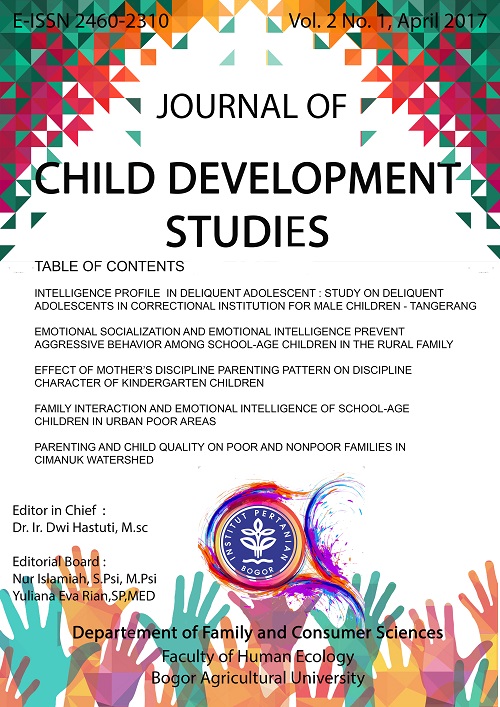Effect of Mother’s Discipline Parenting Pattern on Discipline Character of Kindergarten Children
Abstract
This research aimed to analyze the effect of maternal discipline on discipline of children at two kindergarten in Bogor City. The research design used was a cross sectional study involving 46 mothers and children, selected by accidental sampling, and the data were collected using a questionnaire. Parenting discipline was measured using a questionnaire of The Dimensions of Discipline Inventory (DDI), which was adapted and modified from Straus and Fauchier (2011) with a Cronbach's alpha value of 0.864, and Character Development Questionnaire Preschooler adapted and modified from Hastuti (2014) with a Cronbach's alpha value of 0649. The results showed that there was a significantly positive correlation between the lenght of education and mother’s implementation of discipline, and there is a significantly positive correlation between marital status with cognitive appraisal of discipline. Cognitive appraisal of discipline is an opinion or judgment against parent parenting discipline either approved or not. Discipline of children was influenced by mother’s length of education, mother’s age, and situation in the application of discipline by mother (R2 Adjusted= 0.492). The situation in the application of discipline is a state or condition of the mother when applying disciplinary behavior to children.
Downloads
References
Anderson, S., Murray, L., Brownlie, J. (2002). Disciplining children: research with parents in Scotland. Edinburgh: Scottish Executive Central Research Unit.
Day, R.D., Peterson GW, McCracken C. (1998). Predicting spanking of younger and older children by mothers and fathers. Journal of Marriage and the Family. 60: 79-94.
Dwiyanti, R. (2013). Peran orang tua dalam perkembangan moral anak (kajian teori Kohlberg). Prosiding seminar nasional parenting. 161-169.
Ghate, D., Hazel, N., Creighton, S., Finch, S., Field, J. (2003). The national study of parents, children and discipline in Britain. London: Policy Research Bureau.
Hastuti, D. (2015). Pengasuhan: teori, prinsip, dan aplikasinya di Indonesia. Bogor (ID): IPB Press.
Halpenny, A.M., Nixon, E. ( 2009). Parenting styles and discipline: parents and children perspectives. Dublin: Department of Health and Children.
Helmi, A.F. (1996). Disiplin kerja. Buletin Psikologi. 4(2): 1-2.
Hidayati, E. (2008). Hubungan pengetahuan ibu tentang perkembangan psikomotor anak usia 3-5 tahun di desa sarirejo kecamatan guntur kabupaten demak. Jurnal keperawatan. 1(2): 12-22.
Hurlock, E.B. (1980). Psikologi Perkembangan: suatu pendekatan sepanjang rentang kehidupan. Edisi 5. Istiwidayanti, Soedjarwo, penerjemah; Sijabat, R, M, editor. Edisi ke-5. Jakarta (ID): Erlangga. Terjemahan dari Developmental Psycology: A life-Span Approach.
Kassabrim, M.K, Strauss, M.A. (2011). Discipline methods used by mothers: the contribution of ethnicity, socioeconomic status, and childs characteristics. Journal of Child Ind Res. 4: 45-57. doi: 10.1007/s12187-010-9077-z.
Kerr, D., Lopez, N., Olson, S., Sameroff, J. (2004). Parental discipline and externalizing behavior problems in early childhood: the roles of moral regulation and child gender. Journal of Abnormal Child Psychology. 32(4): 369-383.
Latifah, M., Alfiasari, Hernawati, N. (2009). Kualitas tumbuh kembang, pengasuhan orang tua, dan faktor risiko komunitas pada anak usia prasekolah wilayah pedesaan di bogor. Jurnal Ilmu Keluarga Dan Konsumen. 2(2): 143-153.
Lickona, T. (1992). Educating for Character: How Our Schools Can Teach Respect and Responsibility. New York (USA): Bantam Books.
Megawangi, R. (2009). Pendidikan Karakter: solusi yang tepat untuk membangun bangsa. Jakarta (ID): Indonesia Heritage Foundation.
Puspitasari, R., Hastuti, D., Herawati, T. (2015). Pengaruh pola asuh disiplin dan pola asuh spiritual ibu terhadap karakter anak usia sekolah dasar. Jurnal Pendidikan Karakter. 5(2): 208-218.
Regalado, M., Larson, K., Wissow, L., Halfon, N. (2010). Factor associated with discipline counseling for parents of infants and young children. Journal of Academic Pediatrics. 10: 353-359.
Renk, K., McKinney, C., Klein, J., Oliveros, A. (2006). Childhood discipline, perceptions of parents, and current functioning in female college students. Journal of Adolescene. 29: 73-88. doi:10.1016/j.adolescence.2005.01.006.
Ridowati, I.A., Widodo. (2015). Analisis pola asuh orang tua (ibu single parent) dalam membentuk disiplin anak usia 4-6 tahun di desa mranggen kecamatan purwosari kabupaten kediri. Jurnal Pendidikan Luar Sekolah. 4(1): 1-15.
Santrock, J.W. (2007). Perkembangan Anak. Ed. Ke-11. Jakarta (ID): Erlangga.
___________(.2012). Life-Span Development: perkembangan masa-hidup. Ed. Ke-13. Jakarta (ID): Erlangga.
Straus, M.A,, Fauchier, A. (2011). Manual for the dimensions of discipline inventory (DDI). Family research laboratory: University of New Hampshire.

